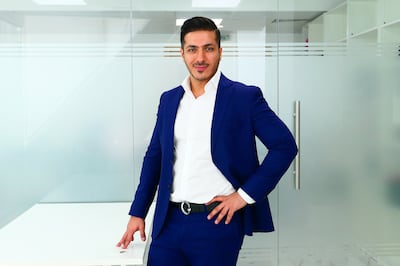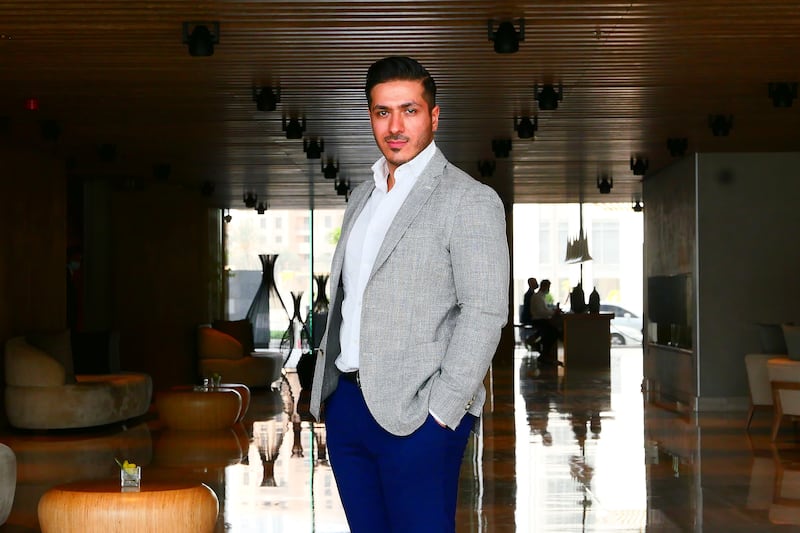Hamed Eslamian is the founder of Black And Blanc Fleur, a UAE online delivery service for premium flowers, candles and sweets .
Born in the Middle East and living in Dubai since childhood in 2004, he began his career with his family's petrochemical trading company.
Mr Eslamian, who is 28 and owns a home in Dubai’s Jumeirah Golf Estates, holds an entrepreneurial business certificate from Harvard Business School.
He launched his e-commerce platform in 2017.
Were you brought up around money?
My dad has been an entrepreneur all his life, creating multiple businesses around the world. I was raised in a wealthy family. I had friends who had everything they wanted, but my father never gave us that feeling that we had everything. From a young age, he made us work for whatever we wanted.
I used to go to his office in summer, to do simple tasks. I wanted a PlayStation PS1, so that was my payment at the end of summer. This taught me that things were not going to come easy. I didn’t appreciate it at that point, but I do now.
What was your first salary?
After university, I applied to different companies and got a couple of offers but, due to some visa problems, I could not start working. So, I ended up coming to the family business against my wishes seven years ago. I don’t like to put myself in a comfort zone.
My father paid me the exact amount I was offered, Dh12,000. I was initially paid lower than other people. I was considered an entry-level employee in the purchasing department. I didn’t feel like I was being treated differently. I liked that.
Why launch a flower delivery company?
I was not going to be the final decision-maker (in the family business). I wanted to make sure my ideas and perspective were applied 100 per cent, so looked for an opportunity to start something.
I always enjoyed the online part of business, offering products and services from a B2C (business to consumer) perspective. After a couple of years, when I had savings, I saw potential in selling flowers. A flower business could be the same all around the world; what makes the difference is the marketing you put into it.
We started our own marketing company and IT infrastructure so that, no matter what products you put into it, it could turn into an online business. Black And Blanc was a starting point.
How did you feel committing your savings?
You are counting every cent you are spending and making sure everything is being put into the business properly. Sometimes you have to make sure you are working harder, but when you have something of your own in the business, the amount of effort, time and thought you put in is different than when you bring an investor from outside. If it succeeds, you succeed.
Are you a saver or a spender?
In general, I’m a saver but I can be a very big spender. When it comes to technology, I don’t really have much control over myself and make sure I have the latest products for work.
I make sure that money I’ve earned is not going to waste. I rarely spend on things I consider unnecessary, but never sacrifice quality of life for saving. At this point, I have the quality of life I’m expecting for myself to perform at the highest level.
One thing I do to avoid burnout, no matter how busy my schedule, is go to the gym from six to eight every morning. Travelling, whenever I get a chance, is also my escape.

How do you grow your cash?
I have investments in properties in Dubai and elsewhere in the Middle East. I made my first investment in cryptocurrency before the Covid-19 pandemic – before it was so hot. I’m trying to put eggs in different baskets.
You should always dedicate a percentage to high risk [assets] but for the other 90 per cent, it is better to go with safer options that have long-term returns. I’ve seen people put 100 per cent of their investments into cryptocurrencies.
What investment are you most proud of?
A townhouse in Brooklyn, New York. The price has risen rapidly. When I bought it in 2018, Brooklyn was not considered an interesting investment place, but now it is one of the fastest-growing communities. I was there with a friend who suggested this, looked at the numbers and we bought it, did a renovation and it’s rented out.
Making that decision, at that point in life, was very important. It was risky, but turned out to be a good investment.
Did it increase your risk appetite?
It’s had a better result than expected, but that doesn’t mean I’m going to get lucky with future decisions. Sometimes, the market goes in a way you don’t expect – it doesn’t mean you are lucky or unlucky. I’m still using the same logic I did at that time to make new decisions. Having success in that investment is not going to increase or reduce risk in my current decisions.
How do you view money?
I consider it a tool that can facilitate things that improve life. I never work for money. I’m always trying to do the kind of work that makes me happy in the best manner I can.
At the end of the day, I don’t think money is the prize for what you are doing. Instead, it is the experience you gain from that work (that is important). Money is an indication of how successful that experience has been. It’s a measure; it’s never been the final goal for me.
Are you wise with money?
Over the long term, I make sure I’m putting money into areas that could help me and my business to grow. I try not to be reactive when it comes to spending, never do emotional purchases or make irrational investments. I measure every aspect before taking action when it comes to expenditure.
Do you spend on luxuries?
You should call something luxury when maybe it is a bit out of your budget. If I travel five times a month, maybe that’s a luxury, but when it’s necessary for me to have in my life to make sure I’m performing at my best … luxury and necessity really depend on where you are in life. Good food … usually, I’m very careful in terms of what I’m putting in my body. Something luxury for you could be a necessity for me.
What impact has the pandemic had on your business?
There were not that many businesses selling flowers online and our figures increased maybe 300 per cent over a week. People could not see each other, so by sending flowers they were sending a message.
The pandemic taught us all a lesson: no matter how smoothly everything is running, it could stop in an eye blink.
Do you think about retirement?
Never, but I’ve been thinking about a point in life where I don’t need to work anymore. This was my main aim, to make sure I have businesses that are self-sufficient so that I have the option to step back. I don’t see myself not working, but my goal is to make the businesses reach a point [where] they don’t require me anymore.






